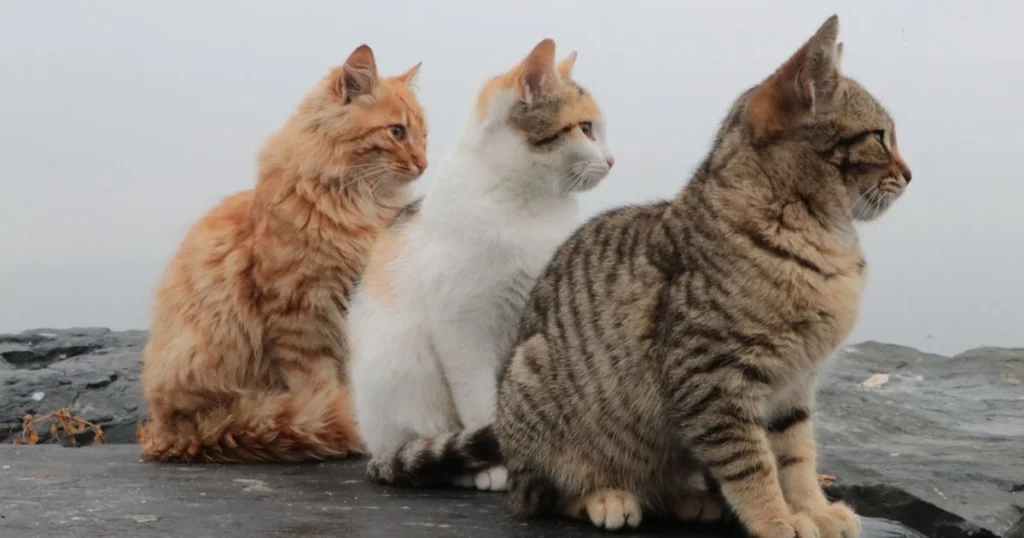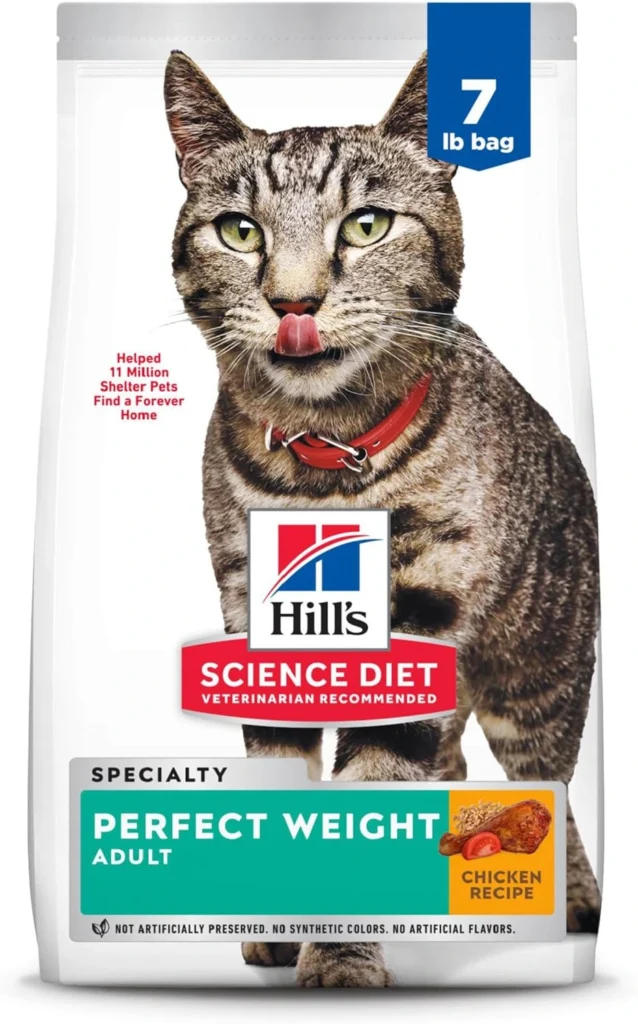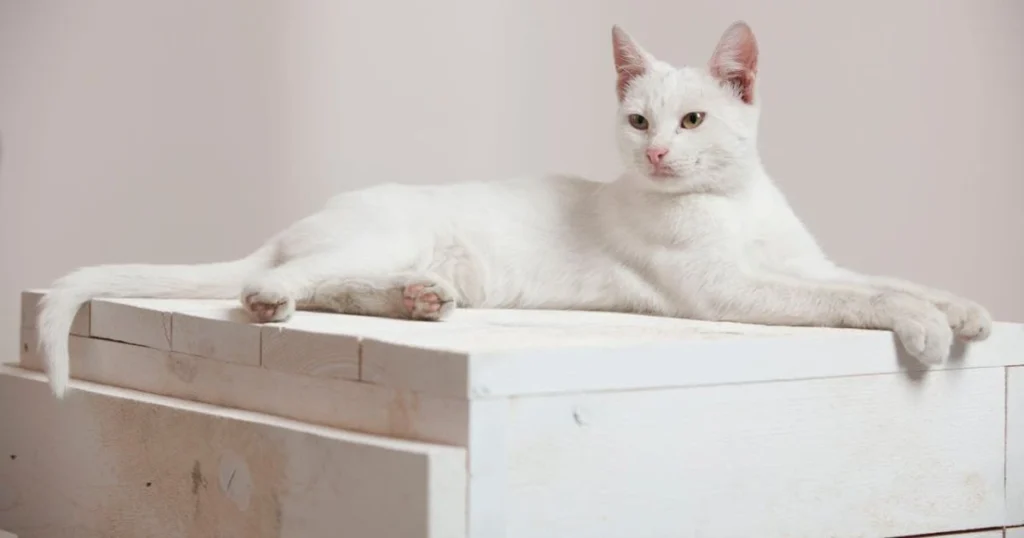As a devoted cat parent, I know the joy of watching our feline friends thrive. Some cats seem to gain weight easily, while others stay sleek and healthy. Keeping your cat at the right weight is key for their health and happiness. In this guide, we’ll dive into feline fitness to help your kitty stay in top shape.
Domestic cats vary in size and weight, depending on breed, age, and gender. While most cats should weigh about 10 pounds, many are overweight or obese. This is a big concern because extra weight can cause health issues and shorten their lives. Knowing your cat’s ideal weight helps you keep them healthy and happy.
The Importance of Maintaining Ideal Weight for Cats
Keeping your cat at the right weight is key for their health. Obesity is a big problem in cats, leading to serious issues like diabetes and arthritis. Even a small amount of extra weight can raise the risk of these problems.
Health Risks of Obesity in Cats
Overweight cats are more likely to get type 2 diabetes. They also face higher risks of heart disease and cancer. Sadly, they may live up to 5 years less than healthy cats.
Being overweight can make it hard for cats to move and may lead to accidents in the house. Keeping your cat at a healthy weight is vital to avoid these problems.
Benefits of Healthy Cat Weight
On the other hand, a healthy weight has many benefits. It helps keep joints healthy and reduces disease risks. It also makes your cat’s life better.
Working with your vet is important to find the right weight for your cat. They can help you create a plan to keep your cat at a healthy weight.
“Maintaining an ideal weight is crucial for your cat’s overall health and well-being.”
Understanding Average Cat Weight
Knowing the average cat weight is key to keeping your cat healthy. A cat’s weight changes based on age, breed, and gender. Knowing the typical weight ranges helps you see if your cat is at a healthy weight.
Cat Weight Chart by Age
Kittens grow and their weight goes up steadily. A newborn kitten weighs 70 to 100 grams. Larger breeds, like the Maine Coon, can be up to 170 grams at birth.
Healthy kittens gain about 100 grams a week. They usually reach their adult weight by 44 weeks old.
Cat Weight Chart by Breed
The right weight for cats varies by breed. For example, a British Shorthair or Bengal cat should weigh 9 to 15 pounds. A Siamese cat might weigh 5 to 10 pounds.
Larger breeds, like the Maine Coon, can weigh up to 25 pounds. They can still be healthy.
Knowing the right weight for your cat’s breed is important. It helps keep them healthy and avoids obesity or being too thin.
“Monitoring your cat’s weight and keeping them within the healthy range is crucial for their overall well-being and longevity.”
Factors Influencing a Cat’s Ideal Weight
Keeping your cat at a healthy weight is key to their happiness. It’s vital to know what affects a cat’s ideal weight. Age, gender, and if they’ve been spayed or neutered all matter.
Age and Gender
Young cats usually weigh less than older ones. Kittens and young cats burn calories fast, which helps them stay slim. As they get older, their weight might go up. Male cats tend to be bigger and heavier than females.
Spaying/Neutering
Spaying or neutering changes a cat’s weight. It can make them gain weight because their metabolism slows down. To keep your cat at the right weight, adjust their food and make sure they get enough exercise.
| Factor | Impact on Ideal Weight |
|---|---|
| Age | Younger cats weigh less, while older cats tend to gain weight |
| Gender | Male cats are generally larger and heavier than females |
| Spaying/Neutering | Slower metabolism leading to increased risk of weight gain |
Knowing these factors helps you and your vet find the right weight for your cat. Together, you can make diet and lifestyle changes to keep your cat healthy and joyful.
Ideal weight for domestic cats
Keeping your cat at the right weight is key for their health and long life. Most adult cats should weigh between 8 to 12 pounds (3.6 to 5.4 kg). This is the ideal weight range for domestic cats.
But, the right weight can change based on breed, age, and gender. For instance, Maine Coon cats can grow up to 20 pounds. On the other hand, Himalayan cats might only weigh 7 pounds.
Kittens grow differently. At 6 to 8 weeks, they can weigh from just under 2.2 pounds to 4.5 pounds. They usually reach their adult weight by 9 to 12 months.
| Breed | Healthy Weight Range (Pounds) |
|---|---|
| Maine Coon | 10 – 20 |
| Himalayan | 7 – 12 |
| British Shorthair | 9 – 17 |
| Siamese | 8 – 12 |
| Persian | 7 – 12 |
| Ragdoll | 10 – 20 |
It’s vital to keep your cat’s weight in the healthy weight range. Regular checks and adjusting their diet and exercise can help. This ensures they stay at their ideal weight.

photo by Selçuk Çalışır
“Keeping your cat at a healthy weight is one of the best things you can do to support their long-term wellness and prevent serious health issues.”
Signs of Overweight or Underweight Cats
Keeping your cat at the right weight is key for their health. There are ways to check if your cat is at a healthy weight. The body condition score (BCS) system is one tool used by vets to check a cat’s body fat and muscle.
Body Condition Score System
The BCS system helps vets see if a cat is underweight, at the right weight, or overweight. Cats with a BCS of 1-3 are too thin. A BCS of 4 is perfect. Cats with a BCS of 5-9 are overweight or obese.
To check your cat’s BCS, feel their ribs, spine, and hips. Look at their body shape too.
- Underweight Cats (BCS 1-3): These cats have very prominent ribs, spine, and hip bones, with no discernible body fat.
- Ideal Weight Cats (BCS 4): A healthy cat has a well-proportioned body with a slight abdominal tuck and a moderate layer of fat over the spine and hip bones.
- Overweight Cats (BCS 5-9): Cats with a BCS of 5-9 have no visible waist and a thick layer of fat covering their ribs, spine, and hips.
It’s important to watch your cat’s weight and body condition regularly. This helps keep them healthy and prevents obesity problems. If you’re not sure about your cat’s weight, talk to your vet. They can give you a proper check-up and advice.
Medical Conditions Affecting Cat Weight
Keeping your cat at a healthy weight is key for their well-being. But, some health issues can cause unexpected weight changes. It’s important to know these factors to help your cat stay healthy.
Diseases Contributing to Weight Gain
Some health problems can make cats gain weight. For example, arthritis can make it hard for cats to move and exercise. This leads to a sedentary lifestyle and weight gain.
Acromegaly, a hormonal disorder, and hypothyroidism, a thyroid imbalance, also cause weight gain in cats.
Diseases Contributing to Weight Loss
Some health issues can cause cats to lose weight unintentionally. Inflammatory bowel disease can make it hard for cats to absorb nutrients, leading to weight loss.
Hyperthyroidism, an overactive thyroid, and kidney disease are also common causes of weight loss in cats.
| Medical Condition | Effect on Cat Weight |
|---|---|
| Arthritis | Weight Gain |
| Acromegaly | Weight Gain |
| Hypothyroidism | Weight Gain |
| Inflammatory Bowel Disease | Weight Loss |
| Hyperthyroidism | Weight Loss |
| Kidney Disease | Weight Loss |
It’s vital for pet owners to recognize these health issues and their effects on cat weight. Working with your vet can help your cat stay healthy and at a good weight for their whole life.
Weight Loss Tips for Overweight Cats
Keeping your cat at a healthy weight is key to their happiness. If your cat is overweight, there are ways to help them lose weight. Here are some effective tips for your feline friend.
Dietary Changes for Weight Loss
Changing your cat’s diet is a big step in weight loss. Switch to a high-protein, low-carb cat food made for weight loss or senior cats. Slowly cut their calories but make sure they get all the nutrients they need. Treats should be less than 10% of their daily calories to avoid weight gain.
Increasing Activity Levels
Getting your cat to move is crucial for weight control. Give them 30 to 60 minutes of play and enrichment each day. Use toys, climbing walls, and food puzzles to keep them active. This helps them burn calories and stay healthy.
| Statistic | Data |
|---|---|
| Overweight or Obese Cats in the US | Approximately 60% of cats in the United States are overweight or obese according to the Association for Pet Obesity Prevention. |
| Recommended Daily Exercise | Cats need about 30 to 60 minutes of exercise each day to help with weight loss. |
| Ideal Treat Ratio | Treats should ideally constitute less than 10% of a cat’s daily caloric intake. |
Always talk to your vet to figure out the right calories for your cat. With the right diet and more exercise, your cat can reach a healthy weight. This will make them happier and more active.
Weight Gain Tips for Underweight Cats
Keeping your cat at a healthy weight is key to their happiness. But, some cats find it hard to gain the weight they need. If your cat is underweight, there are ways to help them get to their ideal weight.
High-Calorie and Nutrient-Dense Foods
Feeding your cat high-calorie, nutrient-rich wet or canned foods is a great start. These foods have more calories than dry kibble, making it easier for your cat to gain weight. High-fat diets are especially good because fat has more calories than protein or carbs.
Encouraging Increased Food Intake
To get your cat to eat more, try warming their food slightly. This can make it more tempting. You can also hand-feed them or give them smaller meals more often. This can help them eat more.
If your cat still can’t gain weight, talk to your vet. They might suggest a feeding tube to help your cat get the nutrients they need.

“Increase cat food intake by 10-20% increments if a cat is underweight despite eating an appropriate amount for its ideal weight.”
By following these tips and working with your vet, you can help your underweight cat reach a healthy weight. This will ensure they live a happy and healthy life.
Maintaining Healthy Weight Long-Term
Keeping your cat at a healthy weight is key for their long-term health. Focus on portion control, a regular feeding schedule, and keeping them active.
Portion Control and Feeding Schedule
Free-feeding can lead to weight gain. Instead, give measured meals at set times. Use a microchip-enabled feeder to control portions. This helps prevent weight gain and keeps your cat healthy.
Environmental Enrichment
Boredom can make cats eat too much. So, provide lots of fun activities. Use puzzle toys and catnip toys to keep them busy. Play with laser pointers and feather wands to keep them active.
Slow weight loss is safer for cats. Fast weight loss can cause serious health problems. By controlling portions, feeding regularly, and keeping them active, your cat will stay healthy for a long time.
“Regular weight monitoring and a balanced approach to diet and exercise are essential for keeping your cat in peak physical condition.”
The Role of Veterinary Care
Keeping your cat at the right weight is a team effort. Your vet plays a key role in this. They offer advice tailored to your cat’s health, breed, and other unique factors. Regular visits and weigh-ins help your vet track your cat’s progress and tweak their diet and exercise plan.
Your vet can spot any health issues that might affect your cat’s weight. They can also help pick the right food and portion sizes for your cat. With your vet’s guidance and your commitment, your cat can stay at their ideal weight for life.
Your cat’s health is the most important thing. Your vet is your ally in keeping them healthy. Together, you can help your cat stay at a healthy weight and live a long, happy life.
FAQ
What is the ideal weight range for domestic cats?
Most domestic cats should weigh between 8-12 pounds (3.6-5.4 kg). But, their ideal weight also depends on their age, breed, gender, and health history.
Why is maintaining an ideal weight important for cats?
Obesity is a big health problem for cats. It can lead to diabetes, arthritis, pancreatitis, and kidney disease. Overweight cats may live up to 5 years less than healthy ones.
On the other hand, keeping a healthy weight improves joint health and reduces disease risks. It also makes cats live better lives.
How do I determine if my cat is at a healthy weight?
Look for visual and physical signs to check your cat’s weight. The body condition score (BCS) system is a good tool. It rates cats from 1 to 9.
Cats with a BCS of 1-3 are underweight. A score of 4 is ideal. Scores 5-9 show different levels of overweight or obesity.
What factors can influence a cat’s ideal weight?
Age, gender, and if they’ve been spayed or neutered affect a cat’s weight. Young cats weigh less than older ones. Male cats are usually bigger and heavier than females.
Spayed or neutered cats gain weight more easily. This is because their metabolism slows down. So, it’s important to adjust their food intake.
What are the signs of an overweight or underweight cat?
Look for visual and physical signs to check your cat’s weight. The body condition score (BCS) system is a good tool. It rates cats from 1 to 9.
Cats with a BCS of 1-3 are underweight. A score of 4 is ideal. Scores 5-9 show different levels of overweight or obesity.
Can medical conditions affect a cat’s weight?
Yes, some health issues can cause weight gain or loss in cats. Arthritis, acromegaly, and hypothyroidism can lead to weight gain. Inflammatory bowel disease, hyperthyroidism, and kidney disease can cause weight loss.
It’s important to recognize these health factors for proper treatment.
How can I help an overweight cat lose weight?
To help an overweight cat lose weight, start with dietary changes. Switch to a weight loss or senior formula cat food. Reduce calories and limit treats.
Also, increase physical activity. Play with your cat, provide vertical climbing surfaces, and use food puzzles. This encourages them to burn calories and stay healthy.
How can I help an underweight cat gain weight?
For underweight cats, feed high-calorie wet or canned foods. Make mealtime more appealing by warming the food or hand-feeding.
Feed smaller, more frequent meals. This helps underweight cats get the extra calories they need to gain weight.
How can I maintain my cat’s healthy weight long-term?
To keep your cat at a healthy weight, control portions and establish a regular feeding schedule. Provide environmental enrichment to prevent boredom and overeating.
Avoid free-feeding. Use tools like microchip pet feeders to ensure cats get the right amount of food at each meal.
Why is working with a veterinarian important for managing my cat’s weight?
Working with a veterinarian is key for managing your cat’s weight. They can give personalized advice based on your cat’s health, breed, and other factors.
Regular check-ups and weigh-ins help monitor progress. This allows for adjustments to diet and exercise plans as needed.

Hill’s Science Diet Perfect Weight, Adult 1-6, Weight Management Support, Dry Cat Food, Chicken Recipe, 7 lb Bag


Thank you for your articles. I find them very helpful. Could you help me with something?
something like what 🙂
Please tell me more about this. May I ask you a question?